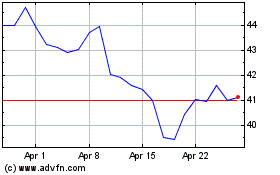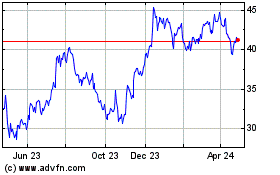U.S. Bancorp Posts Rise in Earnings -- WSJ
April 19 2018 - 3:02AM
Dow Jones News
By Christina Rexrode
This article is being republished as part of our daily
reproduction of WSJ.com articles that also appeared in the U.S.
print edition of The Wall Street Journal (April 19, 2018).
U.S. Bancorp reported a 13% rise in first-quarter earnings,
helped by higher interest rates and a lower tax levy.
The Minneapolis-based bank, which is the largest regional bank
and the seventh-largest bank in the U.S. by assets, said Wednesday
that profit increased to $1.68 billion. Per-share earnings were 96
cents, beating the 94 cents expected by analysts polled by Thomson
Reuters. Revenue rose 3%, to $5.47 billion.
Analysts said it was a mixed quarter for the bank.
Interest-related income was strong, but fee income was lower than
expected. Shares fell 2% on Wednesday. The stock has underperformed
and is down about 7% this year.
On the firm's earnings call, executives said the U.S. economy is
on solid footing, but that they were awaiting the full benefit of
the recently enacted tax law.
They said some business customers were spending their windfall
from a lower tax rate, which fuels lending. Chief Executive Andy
Cecere said he anticipates business lending to pick up later this
year based on conversations with customers and expectations of
strong loan growth.
"While the business confidence has not translated into increased
lending activity yet, we believe it will," Mr. Cecere said.
At the same time, the bank cautioned that some of its commercial
customers, also reaping the benefits of lower corporate taxes, were
flush with cash and therefore would have less need to borrow.
Chief Financial Officer Terry Dolan, in an interview, described
a dichotomy in how the tax law is affecting businesses. Smaller
businesses are already borrowing more, he said. But large
multinationals have fewer lending needs because they are
repatriating cash they had held overseas. "It's a little bit of a
tale of two cities," Mr. Dolan said. "But we're optimistic."
Higher interest rates, which allow banks to charge more on
loans, have been a boon to the banking sector. Net interest income
was up 5.5% from the year-ago period, while the bank's net interest
margin, which is a measure of lending profitability, expanded
slightly. The Federal Reserve has raised short-term rates six times
since late 2015.
The new tax law lowered the corporate rate, benefiting U.S.
Bancorp and others. The bank said its effective tax rate was 17.7%
in the first quarter, down from 25.1% the year before.
Average loans rose 2% from a year before. Commercial real estate
was down, and the bank cited increased competition from nonbank
lenders. Other commercial lending was up. Mortgage and credit-card
lending also increased.
Compared with the year before, the bank trimmed the amount it
set aside for possible credit losses.
Average deposits increased 2%. Total assets rose about 2% as
well, to $460 billion.
That level of assets means a bill passed last month by the
Senate to ease regulations on small and midsize banks won't hold
great benefit for U.S. Bancorp. The legislation would raise a
threshold at which banks face stricter oversight to $250 billion
from $50 billion. House lawmakers are reviewing the bill.
Write to Christina Rexrode at christina.rexrode@wsj.com
(END) Dow Jones Newswires
April 19, 2018 02:47 ET (06:47 GMT)
Copyright (c) 2018 Dow Jones & Company, Inc.
US Bancorp (NYSE:USB)
Historical Stock Chart
From Jun 2024 to Jul 2024

US Bancorp (NYSE:USB)
Historical Stock Chart
From Jul 2023 to Jul 2024
